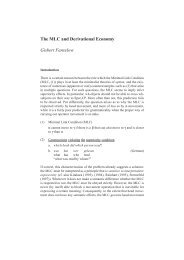Differential subject marking in Polish: The case of Genitive vs ...
Differential subject marking in Polish: The case of Genitive vs ...
Differential subject marking in Polish: The case of Genitive vs ...
Create successful ePaper yourself
Turn your PDF publications into a flip-book with our unique Google optimized e-Paper software.
cease or cont<strong>in</strong>ue that otherwise only precede imperfective <strong>in</strong>f<strong>in</strong>itives; cf. (13) (see Borik<br />
2002:153 for Russian data). Moreover, BE patterns with imperfective verbs <strong>in</strong> yet another<br />
respect, namely as far as the participle formation is concerned (see Borik 2002:39ff., Piñón<br />
1994:349ff. for detailed discussion). <strong>Polish</strong> has two types <strong>of</strong> adverbial participles: the ‘present<br />
participle’ (imieslów przyslówkowy wspólczesny) and the ‘perfect participle’ (imieslów<br />
przyslówkowy uprzedni). Of these two participles, imperfective verbs have only present<br />
participles (-ac forms) (cf. (14a)), while perfective verbs have only perfect participles (-(w/l)szy<br />
forms) (cf. (14b)) (Piñón 1994:350f.). Example (15) shows that only a present participle (cf.<br />
(15a)), but not a perfect participle (cf. (15b)) can be formed from byc, hence byc behaves like an<br />
imperfective verb (see Borik 2002:153 for the correspond<strong>in</strong>g Russian data).<br />
(12) Jan byl w domu przez dwie godz<strong>in</strong>y. .<br />
John was3.SG.M at home for two hours<br />
‘John was at home for two hours.’<br />
(13) a. Jan przestal byc nauczycielem.<br />
JohnNOM stopped BEINF teacherINSTR<br />
‘John stopped be<strong>in</strong>g a teacher.’ 25<br />
b. Jan przestal<br />
OK czytac /*przeczytac ksiazki.<br />
JohnNOM stopped OK readINF.IMPERF /*readINF.PERF bookACC.PL<br />
‘John stopped read<strong>in</strong>g books.’<br />
(2002:39ff.) argues that “telicity is neither a sufficient nor a necessary condition for perfectivity.” See also<br />
footnote 4.<br />
(i) a. Mary drove the car for an hour/*<strong>in</strong> an hour.<br />
b. Mary ran a mile *for an hour/<strong>in</strong> an hour.<br />
24 But see Junghanns (1997:253, fn. 2). Accord<strong>in</strong>g to him “perfective verbs are good <strong>in</strong> sentences that conta<strong>in</strong><br />
iterative or durative adverbials or <strong>in</strong> contexts that give rise to a correspond<strong>in</strong>g <strong>in</strong>terpretation;” cf. (i). See also<br />
Borik (2002:141).<br />
(i) Takuju zadacu <strong>vs</strong>egda rešiš’.<br />
suchACC taskACC always solve2.SG.PRES.PERF<br />
‘Such a task is no problem.’<br />
25 One should be careful with the application and <strong>in</strong>terpretation <strong>of</strong> such tests. Notice that, unlike <strong>in</strong> the <strong>case</strong> <strong>of</strong><br />
the predicative byc, as <strong>in</strong> (13a) above, this test does not work with (existential)-locative byc; cf. (i). See<br />
Blaszczak (2004) and Blaszczak (to appear) for more discussion on this po<strong>in</strong>t.<br />
(i) # Jan przestal byc w domu.<br />
John stopped BEINF at home<br />
14

















